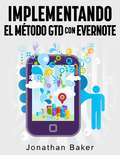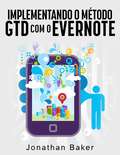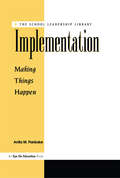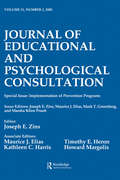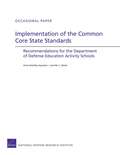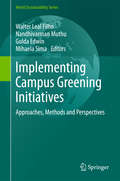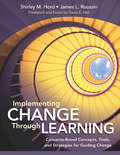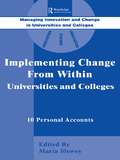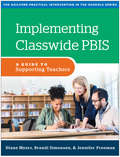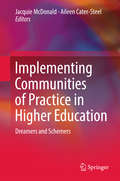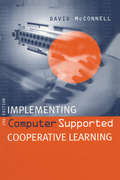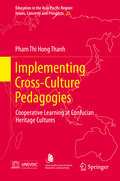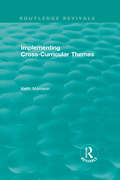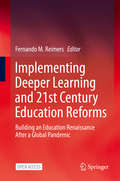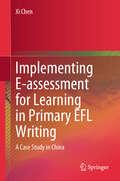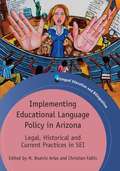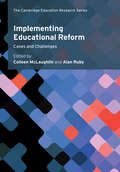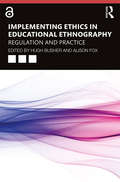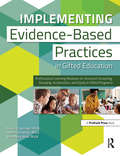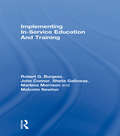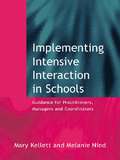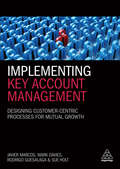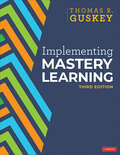- Table View
- List View
Implementando el método GTD con Evernote
by Jonathan Baker Maria Jose BalbontinAprende cómo sacarle el máximo provecho al método GTD y a Evernote. Getting Things Done®, o GTD®, es un método de gestión de tiempo creado por el consultor de productividad David Allen. GTD es una de las técnicas más efectivas y populares que puedes usar para tomar las riendas de tu lista de tareas e incrementar tu productividad. El método GTD no sólo te ayuda a completar las tareas y proyectos inmediatos, sino que también te ayuda a avanzar hacia las metas más grandes en tu vida. Evernote® es un programa que originalmente fue creado para tomar y archivar notas. Estas notas pueden ser de texto, páginas web, mensajes de voz, fotos, y más. Evernote es estupendo para guardar todo tipo de información, y te hace fácil organizar y encontrar tu información. Con los consejos que ofrece este libro podrás combinar Evernote y GTD para crear un poderoso sistema para mejorar tu productividad. Usar el método GTD con Evernote te permitirá organizar tu vida personal y profesional en formato electrónico. Ya que Evernote está disponible como aplicación web y en dispositivos móviles, siempre puedes tener acceso a tus tareas, proyectos, metas y notas cuando y donde las necesites.
Implementando o método GTD com o Evernote
by Janaina De Oliveira Ribeiro Jonathan BakerAprenda a tirar o maior proveito do GTD com o Evernote. Getting Things Done®, ou GTD®, é um método de gerenciamento de tempo criada pelo consultor de produtividade David Allen. GTD é um das técnicas mais populares e eficazes que você pode utilizar para manter a sua lista de afazeres sob controle e aumentar sua produtividade. Além de auxiliar a completar as tarefas e projetos à mão, O GTD também lhe ajudará a caminhar em direção às metas maiores em sua vida. O Evernote® é um software que foi originalmente desenvolvido para fazer e arquivar anotações. Essas anotações podem ser texto, páginas da Web, memorandos de voz, quadros, e mais. O Evernote é ótimo para armazenar todos os tipos de informações, tornando fácil a organização e o acesso a seus dados. Com um pouco do know-how fornecido nesse livro, você poderá casar o Evernote com o GTD para criar uma poderosa máquina de aumento da produtividade. O uso do Evernote com o GTD permitirão que você organize seu trabalho e vida pessoal no formato eletrônico. Desde que o Evernote está disponível como um aplicativo da web e em dispositivos móveis, você sempre poderá ter acesso a suas tarefas, projetos, metas e notas sempre que e onde quer que os necessitar.
Implementation
by Anita PankakeThis book shows school leaders how to put programs and change efforts into action; facilitate and coordinate tasks; monitor progress; and support those responsible for carrying out projects and plans.
Implementation Fidelity in Education Research: Designer and Evaluator Considerations
by Coby Meyers W. Christopher BrandtImplementation science is an important and underrepresented topic in the literature of educational research, despite the fact that it is inextricably tied to education policy and improvement. Implementation fidelity (the degree to which a program or intervention is delivered as planned) is, in particular, a key issue for every program developer and researcher designing, executing, interpreting, or communicating their work. Implementation Fidelity in Education Research provides the first serious developer-evaluator collaborative perspective on the practical considerations of implementation fidelity in program development. Using case studies from Investing in Innovation (i3) fund grants, this book prepares future researchers for the challenges posed by implementation issues both ideologically and in practice. This book will be an excellent resource for anyone interested in education research and evaluation and an excellent supplement to research methods courses.
Implementation of Lung Cancer Screening: Proceedings of a Workshop
by Engineering Medicine National Academies of SciencesThe public health burden from lung cancer is substantial: it is the second most commonly diagnosed cancer and the leading cause of cancer-related deaths in the United States. Given the individual and population health burden of lung cancer, especially when it is diagnosed at later stages, there has been a push to develop and implement screening strategies for early detection. However, many factors need to be considered for broad implementation of lung cancer screening in clinical practice. Effective implementation will entail understanding the balance of potential benefits and harms of lung cancer screening, defining and reaching eligible populations, addressing health disparities, and many more considerations. In recognition of the substantial challenges to developing effective lung cancer screening programs in clinical practice, the National Academies of Sciences, Engineering, and Medicine held a workshop in June 2016. At the workshop, experts described the current evidence base for lung cancer screening, the current challenges of implementation, and opportunities to overcome them. Workshop participants also explored capacity and access issues; best practices for screening programs; assessment of patient outcomes, quality, and value in lung cancer screening; and research needs that could improve implementation efforts. This publication summarizes the presentations and discussions from the workshop.
Implementation of Prevention Programs: A Special Issue of the journal of Educational and Psychological Consultation
by Joseph E. ZinsFirst Published in 2000. Routledge is an imprint of Taylor & Francis, an informa company.
Implementation of the Common Core State Standards: Recommendations for the Department of Defense Education Activity Schools
by Anna Rosefsky Saavedra Jennifer L. SteeleImplementation of the Common Core State Standards: Recommendations for the Department of Defense Education Activity Schools
Implementing Campus Greening Initiatives
by Walter Leal Filho Nandhivarman Muthu Golda Edwin Mihaela SimaFirmly rooted in the theory and practice of sustainable development, this book offers a comprehensive resource on sustainability, focusing on both industrialized and developing nations. Implementing Campus Greening Initiatives: Approaches, Methods and Perspectives is an attempt to promote and disseminate the work being done in this field by universities around the world. The need to integrate the principles and concepts of green campuses and sustainability into the core of students' educational experiences, from high school to college or university, has now been broadly recognized. By doing so, we can ensure that the students of today and tomorrow will acquire the knowledge, skills, attitudes and values needed to create a more sustainable economy and social environment.
Implementing Change Through Learning: Concerns-Based Concepts, Tools, and Strategies for Guiding Change
by Shirley M. Hord Jim RoussinLead successful, lasting reform in your school or district! No matter what change your school or district is facing, this definitive book shows how to involve school and district leaders every step of the way. Developed by pioneers of K-12 change management, the Concerns-Based Adoption Model (CBAM) enables you to: Understand, predict, and address teacher concerns and reactions Use a series of powerful Learning Maps to help individuals and teams manage change See CBAM in action through a running case study Build credibility and trust to set a foundation for meaningful, lasting change
Implementing Change from Within in Universities and Colleges: Ten Personal Accounts from Middle Managers
by Maria SloweyThis volume describes the experiences of a number of middle managers in higher and further education, describing how new developments have demanded new forms of leadership at the middle level of educational institutions.
Implementing Classwide PBIS: A Guide to Supporting Teachers (The Guilford Practical Intervention in the Schools Series)
by Jennifer Freeman Diane Myers Brandi SimonsenFilling a vital need, this is the first comprehensive guide to supporting K–12 teachers in effective implementation of classwide positive behavioral interventions and supports (CWPBIS). The book presents a roadmap for designing and delivering professional development based on behavioral principles. Procedures are outlined for providing data-driven CWPBIS training and coaching that is responsive to the needs of each teacher. User-friendly features include illustrative case studies, learning questions and exercises at the end of each chapter, and reproducible training tools. The large-size format and lay-flat binding facilitate photocopying; purchasers also get access to a Web page where they can download and print the reproducible materials. See also the authors' related teacher/practitioner resource: Classwide Positive Behavior Interventions and Supports: A Guide to Proactive Classroom Management. This book is in The Guilford Practical Intervention in the Schools Series, edited by Sandra M. Chafouleas.
Implementing Communities of Practice in Higher Education
by Jacquie Mcdonald Aileen Cater-SteelIn this edited collection, the authors pick up the communities of practice (CoP) approach of sharing practice in their reflection on the experience of taking their CoP vision from a dream to reality. Their stories articulate the vision, the passion and the challenge of working within and/or changing existing institutional culture and practice. The book discusses strategies that worked and considers the lessons learnt to inspire future dreamers and schemers. The multiple perspectives provided in the case studies will assist higher education leaders, as well as academic and professional staff, in establishing or assessing CoPs. The book offers insights into implementation strategies, practical guidelines and ideas on how CoP theoretical underpinnings can be tailored to the higher education context.
Implementing Computing Supported Cooperative Learning
by David McConnellThis revised edition looks at how computers facilitate learning among groups of individuals. Taking account of the impact of the Internet and web-based learning, the text is aimed at those in the open and distance learning, education and training fields.
Implementing Cross-Culture Pedagogies
by Pham Thi Hong ThanhDuring the last two decades Confucian heritage culture countries have widely promoted teaching and learning reforms to advance their educational systems. To skip the painfully long research stage, Confucian heritage culture educators have borrowed Western philosophies and practices with the assumption that what has been done successfully in the West will produce similar outcomes in the East. The wide importation of cooperative learning practices to Confucian heritage culture classrooms recently is an example. However, cooperative learning has been documented in many studies not to work effectively in Confucian heritage culture classrooms. The reason is that the educators often impose this instructional method on the students without a careful consideration of its appropriateness in the socio-cultural context of Confucian heritage culture countries. This procedure is not effective and professional because learning does not stand alone. Rather, it is shaped and influenced by other factors including teaching methods, learning tasks, assessment demands, workload and the learning culture of students in the local context. For cooperative learning to work effectively in Confucian heritage culture classrooms, reformers need to consider the importation of this approach in line with a careful examination of all supports and constraints that affect those factors that are associated with learning. The volume provides an applied theoretical framework and culturally appropriate and practical instructions that could assist Confucian heritage culture educators and teachers to address various factors at multiple levels in order to optimize success in importing cooperative learning to their classrooms. Overall, it provides strategies to assist Confucian heritage culture teachers to change their teaching practices, redesign lessons plans, design assessment methods, and organize learning activities in a manner that can influence Confucian heritage culture students to shift from employing teacher-centered learning approaches to cooperative learning.
Implementing Cross-Curricular Themes (Routledge Revivals)
by Keith MorrisonPublished in 1994, this book was designed to help primary and secondary school teachers to develop, introduce, manage and monitor the cross-curricular themes of the National Curriculum. It provides realistic and manageable suggestions about the aims of cross-curricular work, curriculum building and management, appropriate teaching and learning styles, assessment, evaluation and record keeping. Completed in the wake of the Government’s full acceptance of the recommendations of the Dearing Report, Implementing Cross-Curricular Themes will help all those responsible for their school’s delivery of this important dimension of the National Curriculum. The readership thus includes primary and secondary teachers and subject coordinators, heads and deputies and all involved in advising and training such staff.
Implementing Deeper Learning and 21st Century Education Reforms: Building an Education Renaissance After a Global Pandemic
by Fernando M. ReimersThis open access book is a comparative analysis of recent large scale education reforms that broadened curriculum goals to better prepare students for the 21st century. The book examines what governments actually do when they broaden curriculum goals, with attention to the details of implementation. To this end, the book examines system level reforms in six countries at various levels of development. The study includes system level reforms in jurisdictions where students achieve high levels in international assessments of basic literacies, such as Singapore and Ontario, Canada, as well as in nations where students achieve much lower levels, such as Kenya, Mexico, Punjab-Pakistan and Zimbabwe. The chapters examine system-level reforms that focus on strengthening the capacity to teach the basics, as in Ontario and Pakistan, as well as reforms that aim at building the capacity to teach a much broader set of competencies and skills, such as Kenya, Mexico, Singapore and Zimbabwe. The volume includes systems at very different levels of spending per student and reforms at various points in the cycle of policy implementation, some just starting, some struggling to survive a governmental transition, and others that have been in place for an extended period of time. From the comparative study of these reforms, we aim to provide an understanding of how to build the capacity of education systems to teach 21st century skills at scale in diverse settings.
Implementing E-assessment for Learning in Primary EFL Writing: A Case Study in China
by Xi ChenThis book examines how e-assessment can be implemented in primary English as a Foreign Language (EFL) writing in an examination-oriented context. It provides valuable insights on e-assessment for learning (E-AfL) to teacher educators and teachers in both local and global contexts, especially teacher educators undertaking professional development programs of assessment in examination-oriented contexts. For researchers and graduate students who are interested in e-assessment for learning (E-AfL) and writing assessment, this book provides them with valuable resources to further their understanding of E-AfL research and broadens writing assessment scholarship. For pre- and in-service teachers and program administrators, the book serves as a practical and accessible guidebook, proffering effective guidance to empower teacher learning of assessment and to apply pedagogic principles to assessment design.
Implementing Educational Language Policy in Arizona
by Christian Faltis M. Beatriz AriasThis volume is a unique contribution to the study of language policy and education for English Learners because it focuses on the decade long implementation of "English Only" in Arizona. How this policy influences teacher preparation and classroom practice is the central topic of this volume. Scholars and researchers present their latest findings and concerns regarding the impact that a restrictive language policy has on critical areas for English Learners and diverse students. If a student's language is sanctioned, do they feel welcome in the classroom? If teachers are only taught about subtractive language policy, will they be able to be tolerant of linguistic diversity in their classrooms? The implications of the chapters suggest that Arizona's version of Structured English Immersion may actually limit English Learners' access to English.
Implementing Educational Reform: Cases and Challenges (Cambridge Education Research)
by Colleen McLaughlin Alan RubyThere is constant pressure on governments and policy makers to raise the standard of education, and to develop appropriate curriculum and pedagogies for students. It is no easy task. This book presents eight specific case studies of education reform implementation which capture how the design and implementation choices of policy makers are shaped by national and historical contexts. They offer real examples of the choices and constraints faced by policymakers and practitioners. The cases are a mix of nationally and locally mandated reforms with five examples from nations where the state initiated and guided reforms. The concluding synthesis chapter highlights commonalities and differences across the cases and disparate responses to shared concerns. Providing a breadth of real-world research, it will assist policy makers, practitioners and other stakeholders interested in system change.
Implementing Ethics in Educational Ethnography: Regulation and Practice
by Hugh Busher Alison FoxProviding theoretical grounding, case studies and practical solutions, Implementing Ethics in Educational Ethnography examines how researchers can overcome ethical dilemmas associated with and encountered during ethnographic research. From the initial stages of research design such as consideration from regulatory bodies, through research occurring in the field to project completion and reporting, it explores many of the factors associated with ensuring culturally sensitive and ethical studies. The book covers key questions including: What can researchers expect of ethical review boards? Where and with whom should dialogue take place about ethicality within research? What effect does a research focus have on regulation and research practice? What is the effect of context on ethical practices? Does the positionality of a researcher have an effect on ethical practices? How do we ensure that ethicality supports the trustworthiness of research projects? Using a range of international case studies, Implementing Ethics in Educational Ethnography provides researchers and students with invaluable details about how to navigate the field, ensuring that they can sustain good ethical practice throughout the life of a research project.
Implementing Evidence-Based Practices in Gifted Education: Professional Learning Modules on Universal Screening, Grouping, Acceleration, and Equity in Gifted Programs
by Susan K. Johnsen Monica Simonds Marcy VossAccording to the Every Student Succeeds Act (ESSA), evidence-based practices are supported by rigorous research designs and demonstrate that they improve student outcomes, but the actual implementation of these practices in schools is limited. This essential guidebook assists coordinators of gifted education in implementing three evidence-based practices: universal screening, grouping, and acceleration. Each module includes an overview of research, administrative and assessment considerations, forms for implementing the practice, scripted presentation slides for educators and parents, and resources. Modules may be used by educators within a series of workshops for an entire school district, on an individual campus or for important stakeholders.
Implementing In-Service Education And Training
by John Connor Marlene Morrison Robert G. Burgess Sheila Galloway Malcolm NewtonFirst published in 1993. Routledge is an imprint of Taylor & Francis, an informa company.
Implementing Intensive Interaction in Schools: Guidance for Practitioners, Managers and Co-ordinators
by Mary Kellett Melanie NindFirst Published in 2003. Routledge is an imprint of Taylor & Francis, an informa company.
Implementing Key Account Management: Designing Customer-Centric Processes for Mutual Growth
by Mark Davies Dr Javier Marcos Dr Rodrigo Guesalaga Dr Sue HoltImplementing Key Account Management is a highly practical handbook that guides readers through the realities of rolling out a functional key account management programme. The book offers an integrated framework for key account management (KAM) that businesses can use to design or further develop strategic customer management programmes, enabling them to overcome the obstacles that organizations often face when rolling out their strategies. Bringing together the experiences of leading experts within this field, Implementing Key Account Management draws on two decades of research and best practice from Cranfield University School of Management, one of the foremost centres for researcher and thought leadership in KAM. Between them, the authors have designed and delivered programmes globally for clients such as Rolls-Royce, Unilever, Vodafone, The Economist and many more. Rigorously researched, well-grounded and practical, this book is - quite simply - the definitive, go-to resource for implementing key account management programmes.
Implementing Mastery Learning
by Thomas R. GuskeyThe definitive classic—updated for our times. After 50 years, Benjamin Bloom’s revolutionary work on mastery learning is more relevant than ever. One of the most widely researched and proven-effective education methodologies in existence, it provides a direct challenge to the traditional, deterministic, time-based approaches to teaching and learning that have perpetuated inequities for generations of children. Mastery learning is the progenitor of many of today’s most promising teaching methods, including competency-based learning, personalized instruction, and differentiated instruction. It helped to elevate the importance and use of formative assessment as a powerful instructional practice. This timely new edition of the foremost practical guide includes: Recent applications of the principles of mastery learning to distance, hybrid, and blended learning environments Updates including evidence from recent implementation efforts, the results of the most current research on mastery learning and its implications for practice Step-by-step guidance on implementation across grade levels and subject areas Supplemental, on-line chapters that unpack the development of effective formative assessments and connections between RTI and mastery learning Written by one of the most highly regarded scholar/practitioners in the field and the leading interpreter of Bloom’s work, this updated guidebook is essential reading for teachers, school leaders, professional learning communities, and anyone who believes that all students can learn well, achieve success, and become confident learners.
